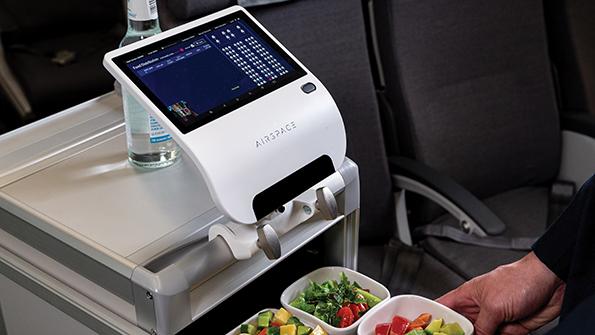
Airbus’ Food Scanner tracks onboard food and beverage consumption.
To help support airlines’ goals of reducing waste to be more sustainable and more cost-effective, Airbus has been working on a prototype of a Food Scanner, an artificial intelligence (AI)-enabled device that tracks and controls inflight catering.
“Some feedback we are getting from several airlines nowadays is that as soon as the aircraft doors close, it’s been basically a ‘black hole’ of information, so we think the Food Scanner should shed a bit of light on what has been going on in the galley,” Airbus cabin and cargo architect Michael Bauer told ATW. He said it will “provide some data on what has been served, what and how much has been eaten, and how much must be thrown away.”
Bauer quoted IATA statistics that estimate “roughly 1.5 kilograms per passenger of cabin waste is being produced on an average flight and about 20% of it is from untouched food and drinks.”
The Food Scanner is an AI-enabled device that analyzes the composition of food in a simple point-and-shoot process.
“The Food Scanner’s downward-looking camera identifies what is on the meal tray as the cabin attendant pulls it out from the trolley during the inflight service, and subsequently captures pictures of what remains when the tray is returned. A horizontally oriented barcode scanner tracks the beverage bottles and cans that typically are placed atop the trolley,” Airbus stated.
Data from the Food Scanner can be processed via a separate, off-board cloud-hosted dashboard that generates key performance indicators (KPIs), using trends and statistics to enable highly accurate catering planning and the prediction of food/beverage consumption. Airbus said this can be further optimized with a preflight meal ordering system made available for passengers—which already is being used by a growing number of airlines, particularly for premium travelers.
The Food Scanner was demonstrated aboard Airbus’ Airspace Explorer A350-900 aircraft during a South Asian demonstration tour, where the first feedback from airlines and cabin crews “was positive,” Bauer said.
In addition to reducing the amount of food and beverages carried during flight—with the associated lower aircraft weight and reduction in fuel burned—Bauer said the Airbus solution holds the promise of better management over the amount of food produced at the origin, along with the reduction in dedicated catering space aboard the aircraft, as well as enhancing the waste collection and separation process. Additionally, Airbus said it would limit the amount of food and beverages that are discarded upon arrival—with certain countries requiring such waste to be burned.
Some airline caterers try to track food consumption and waste in their on-ground catering facilities, Bauer explained, “so they try to avoid and reduce waste during the production using the same kind of technology. So that’s why we believe this innovation is a good complement in terms of data exchange to close up that black hole, which should give a bit of insight.”
– Linda Blachly
